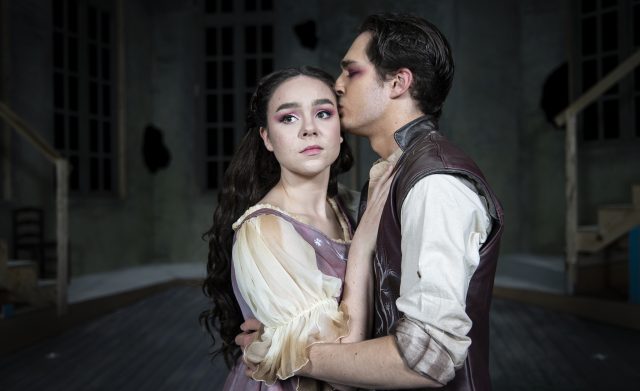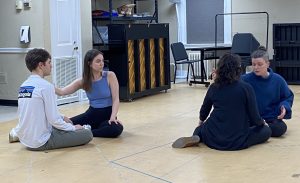
Emily Arthur (left), as Juliet, and Finn Van Horn, as Romeo, rehearse a scene from the Department of Theatre and Film’s production of ‘Romeo and Juliet,’ which opens Thursday (April 21) in Fulton Chapel. In this retelling of the familiar Shakespeare tragedy, even the characters are aware that they are reliving the same story again and again. Photo by Logan Kirkland/Ole Miss Digital Imaging Services
OXFORD, Miss. – If you get a sense of déjà vu watching the University of Mississippi Department of Theatre and Film‘s production of “Romeo and Juliet,” it’s not just because you’ve read or seen the popular play before – it’s because in this retelling of the beloved Shakespeare play, the characters are experiencing déjà vu as well.
“It’s as if they’re caught in this purgatory or limbo,” said director Lindsay Rae Taylor, UM assistant professor of acting. “There’s this idea that they could get out. … There’s a sense of déjà vu and fate, and maybe this time, if I went left instead of right, I could escape this.”
“Romeo and Juliet” opens Thursday (April 21) in Fulton Chapel and runs until Sunday (April 24), with performances at 7:30 p.m. Thursday and Friday and 2 and 7:30 p.m. Sunday. The Friday performance will include ASL interpreting and live captioning; a reception in Bryant Hall will follow.
Tickets are $20 for the general public, $10 for students, and $15 for faculty and staff. They can be purchased from the Ole Miss Box Office at the Ford Center. Call 662-915-7411 or click here to order.
The production is a meditation on why we continue to tell this familiar story again and again, and the lessons we have yet to learn from it.
“If we go to the root of the play, it’s the balance between love and hate – or as I like to think of it, love and fear,” Taylor said. “I would argue that in our world right now, we haven’t learned to put love over hate, so we have to keep telling this story to remind us that love can’t survive because we learn to hate.”
For this production, Taylor explained, the play has been cut and directed in a way that intensifies the feeling that the characters are reliving the same story ad nauseum – streamlining the script, keeping the full cast on stage and treating the characters as an ensemble of storytellers who echo each other’s words and are involved in every scene, not just the ones that focus on them.
“The creative team has had some wonderful ideas, particularly thinking about the costumes, and the idea that the costumes are aging but the characters are not,” Taylor added.
Sophomore Ava Greer, a costume design student from Ocean Springs, is one of the designers for the show. Greer designed all the base costumes, to which elements may be quickly added or abandoned; the actors won’t be out of sight long enough for full costume changes.
“It’s an Elizabethan-modern period fusion,” Greer said. “We took a lot of inspiration from modern fashion and tried to integrate that to make a kind of warped feeling.
“‘Romeo and Juliet’s’ themes are so universal,” and Greer is combining a period silhouette with modern influences that reflect the show’s continuing impact on audiences.
One design element that Greer is especially looking forward to seeing come to life is the treatment being given to the garments to reflect the aging that Taylor referenced.
“Our technicians are doing a lot of great distressing on these clothes, especially on the bottom hems of the clothing,” Greer said. “I’m excited, too, especially seeing the paint work on stage. It makes the costumes very painterly, very illustrative.”
Another modern addition to this centuries-old story is the inclusion of an intimacy director in the rehearsal process to orchestrate and provide support for any moments in the play when performers have to interact romantically.

Finn Van Horn (left), who plays Romeo, and Emily Arthur, who plays Juliet, work with intimacy director MaryBeth Gorman Craig and fight director Sarah Flanagan to choreograph a scene in the Department of Theatre and Film’s production of ‘Romeo and Juliet.’ Photo by Katherine Stewart/Department of Theatre and Film
“The professional industry is trying to shift its culture to being sure that people have awareness of their own boundaries,” and the department wanted to mirror that, Taylor said, pointing out that when people see a kiss in a script, not everyone is envisioning the same thing.
“The idea that you would have an intimacy director is that it’s choreographed just like you would with a fight scene … so lines aren’t blurred between who your character is versus who you are as a person.”
Intimacy director MaryBeth Gorman Craig visited campus for four days in March and hosted consent workshops for students and faculty. She teamed with visiting fight director Sarah Flanagan to create comfortable and safe choreography for the play’s tender moments.
Senior Emily Arthur, of Picayune, who plays Juliet, had never worked with an intimacy director before and said the experience was a highlight of the rehearsal process – and this emerging field in theater is something she’s interested in for her future.
In one scene, Arthur and Finn Van Horn, of Hinsdale, Illinois, who plays Romeo, are supposed to roll downstage. Arthur said every time she envisioned it, “I would just see Finn and me like a tumbleweed rolling down stage, and I was so nervous for that.
“But then seeing the three of them come together, with Lindsay saying, ‘This is my vision,’ and MaryBeth saying, ‘This is how we can make it intimate,’ and Sarah saying, ‘This is how we can make it safe’ … I had no idea what this was going to be, and seeing it go from Lindsay’s head to the choreography was wonderful.”
Besides making the play’s more intimate moments easier and safer to perform, Arthur said this experience had led to growth for her as an actor.
“This is the first time where I can be in a rehearsal and understand that there are plenty of people watching me, but I understand that it’s rehearsal and they’re just watching me work,” Arthur said. “It doesn’t have to be perfect. We’re allowed to figure things out.”
Senior Ashley Wingo, who grew up in Kosciusko and transferred into the BFA acting program from Hinds Community College in Jackson, plays Mercutio – a role she said she was excited to tackle but also found challenging due to the character’s swings between humor and solemnity.
“He’s super vibrant, very extroverted, and although he jokes about anything and everything … when he does get serious, the entire atmosphere changes,” Wingo said. “Everyone feeds off his energy, so if something shifts with him, it kind of shifts with everybody.
“His comedic tendencies and his seriousness are both big challenges.”
Wingo said Mercutio’s most challenging scene is his lengthy “Queen Mab” monologue, in which the character takes a “wild turn.”
“A lot of what he says just doesn’t make sense, and he knows that, but he’s playing it as complete truth,” Wingo explained. “It’s comedic, but then it immediately becomes tragic,” and Wingo said she’s enjoyed working with the director on figuring out what she thinks the character is trying to convey.
“This is definitely my No. 1, most favorite role in all the roles I’ve ever played.”
After a long period of performing in various modified ways, such as virtually or masked, the director ultimately wants this performance – despite its dark themes and tragic ending – to be a joyful experience.
“I just want it to be a big celebration of ritual and of the re-emerging into our art form in the way we like to do it,” Taylor said.



